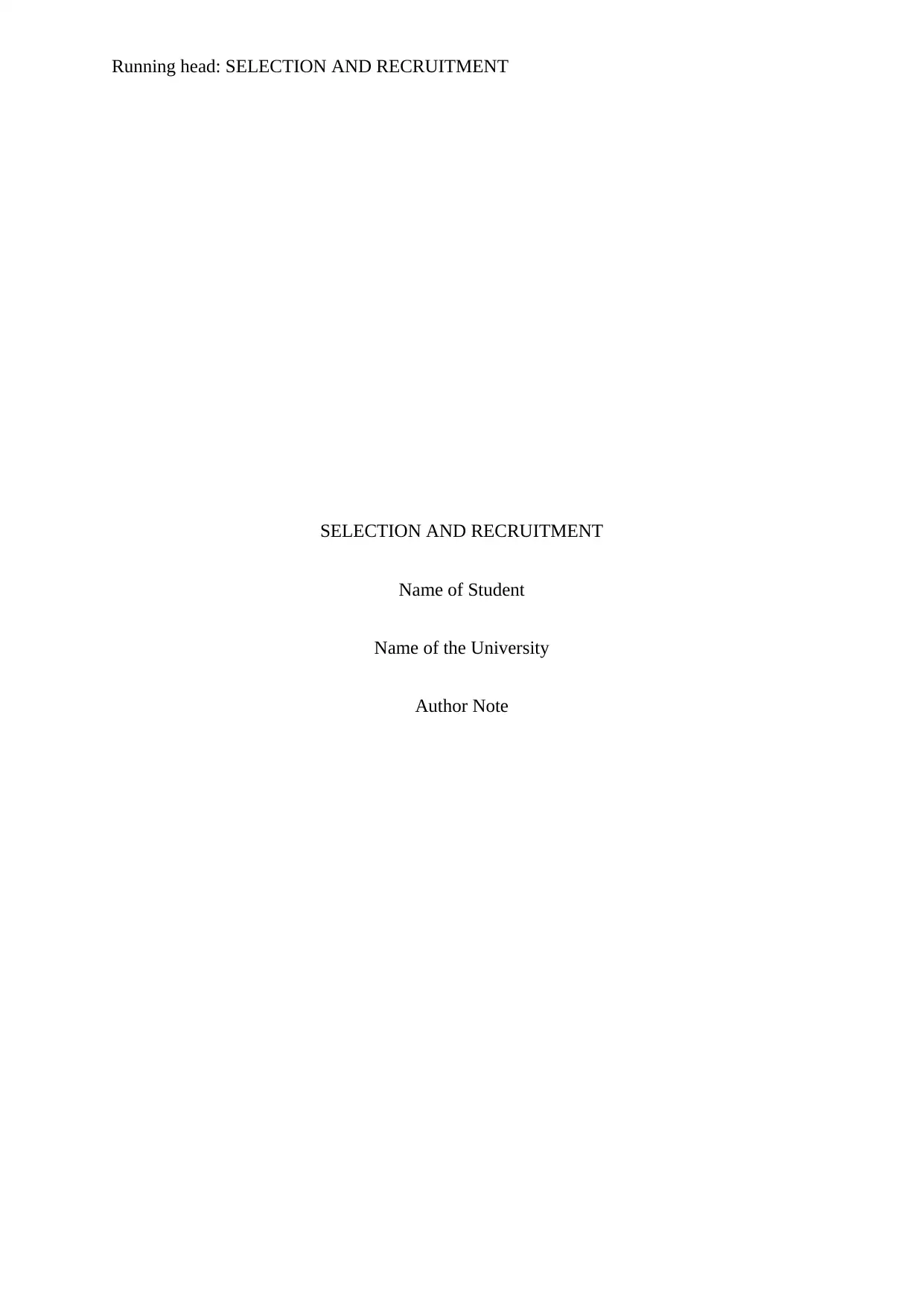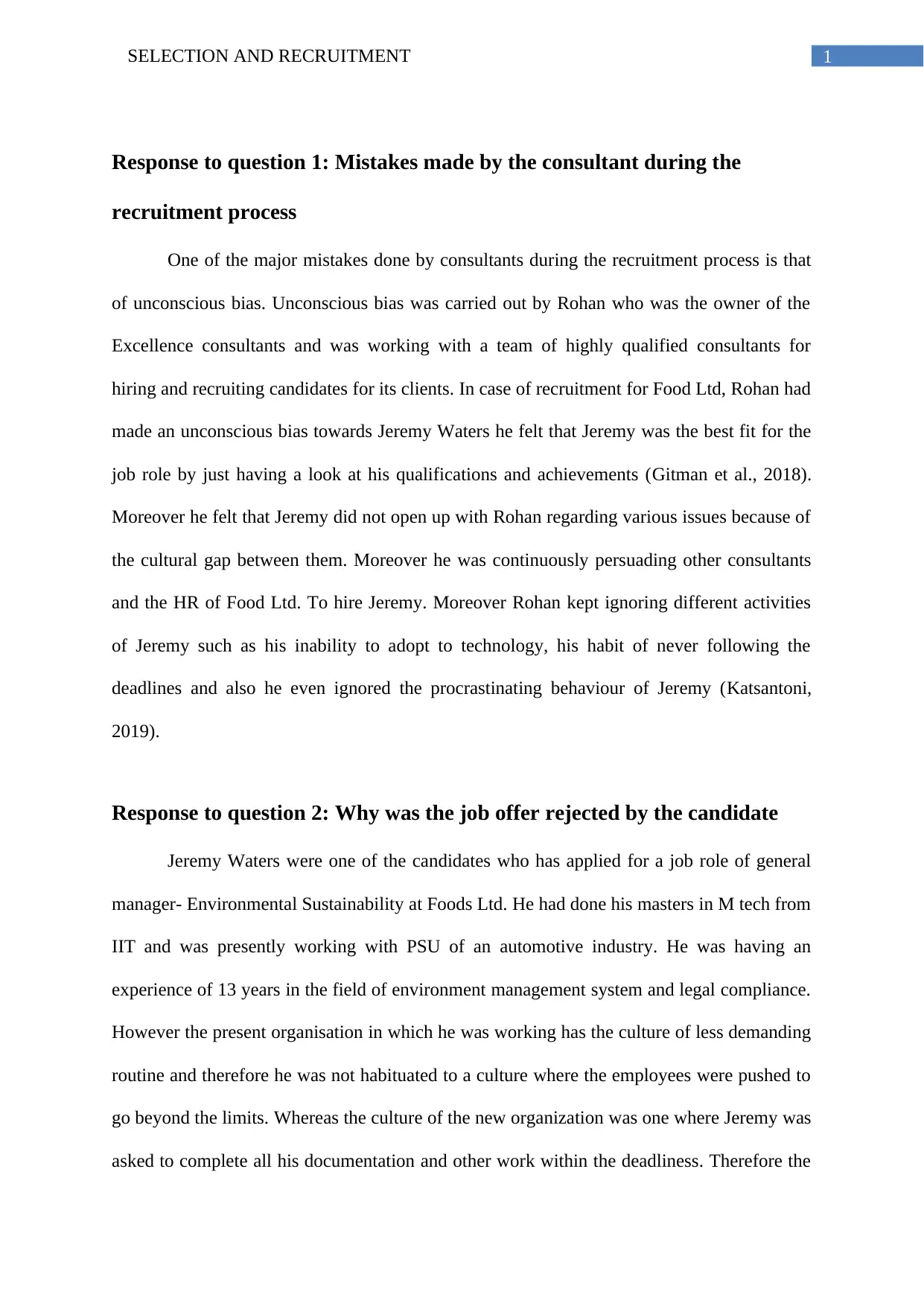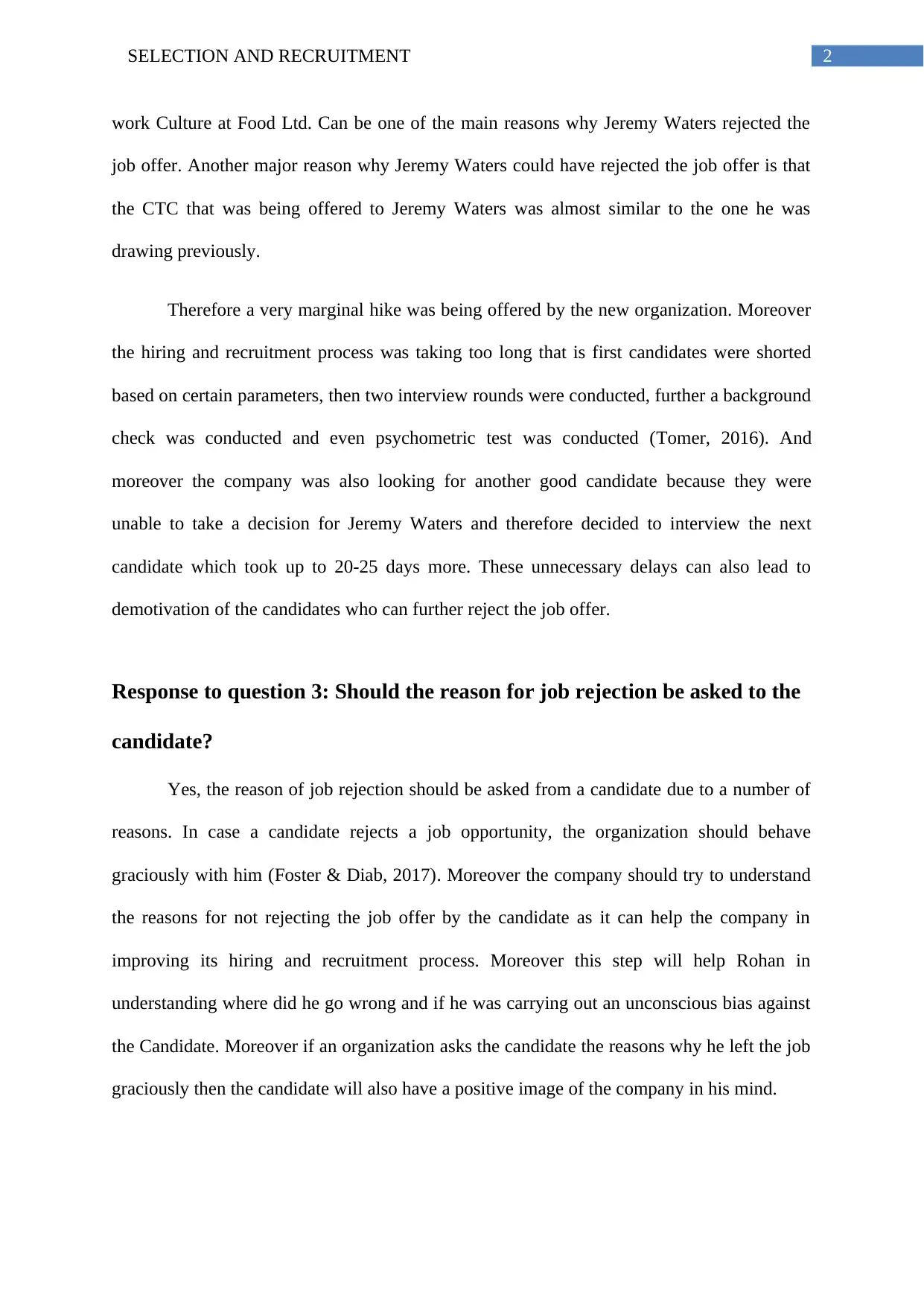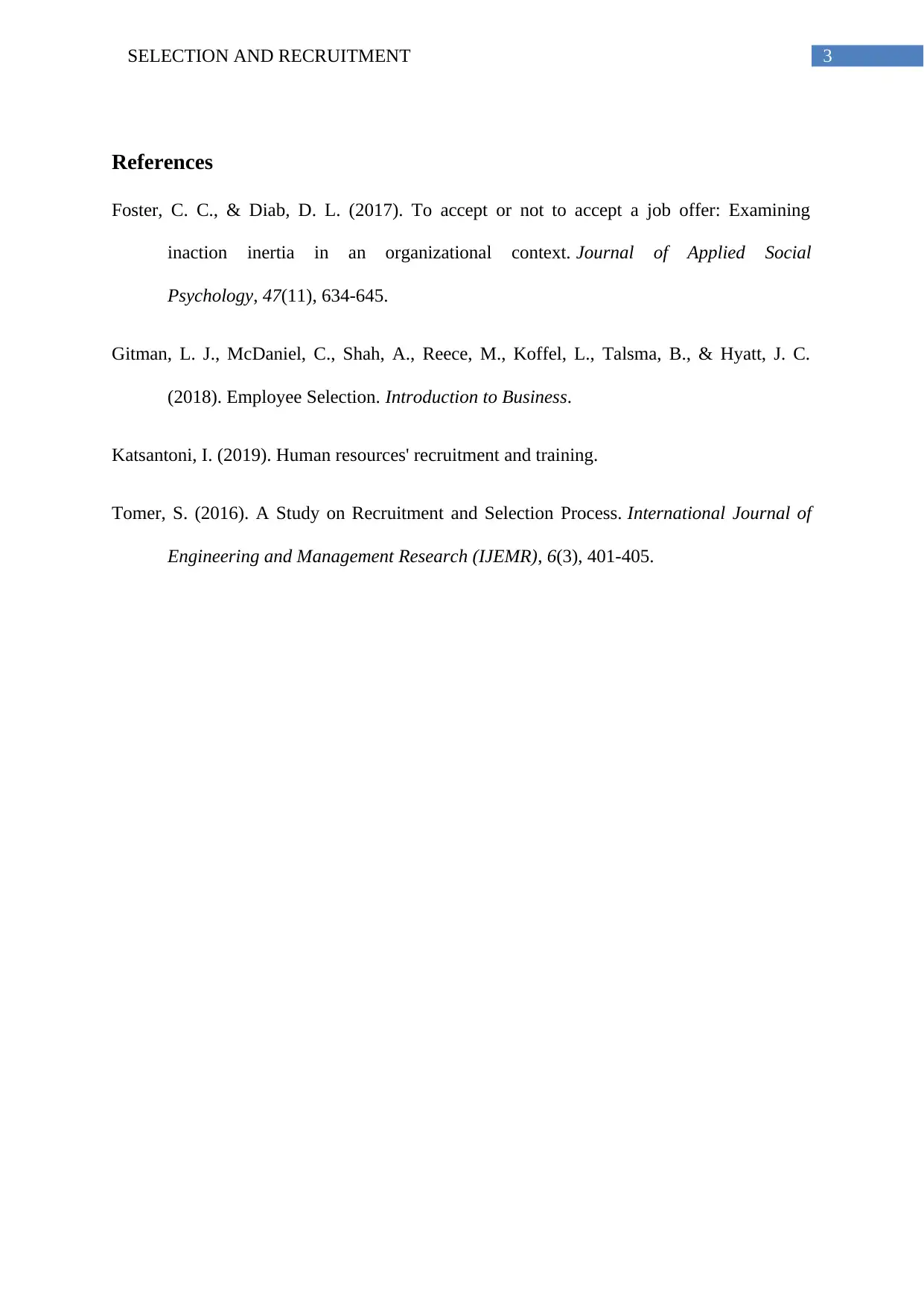414-119-1 Case Study: Excellence Consultants Recruitment Fiasco
VerifiedAdded on 2022/08/17
|4
|813
|18
Case Study
AI Summary
This case study analyzes the recruitment process of Excellence Consultants, focusing on the mistakes made by the consultant, Rohan, who displayed unconscious bias towards a candidate, Jeremy Waters. The analysis explores the reasons behind Jeremy's rejection of the job offer, including cultural differences, a similar CTC, and delays in the hiring process. The solution emphasizes the importance of asking candidates for the reasons for job rejection to improve the hiring process and avoid similar errors in the future. The case study draws upon relevant literature to support its conclusions and recommendations, offering insights into effective recruitment practices and leadership management.

Running head: SELECTION AND RECRUITMENT
SELECTION AND RECRUITMENT
Name of Student
Name of the University
Author Note
SELECTION AND RECRUITMENT
Name of Student
Name of the University
Author Note
Paraphrase This Document
Need a fresh take? Get an instant paraphrase of this document with our AI Paraphraser

1SELECTION AND RECRUITMENT
Response to question 1: Mistakes made by the consultant during the
recruitment process
One of the major mistakes done by consultants during the recruitment process is that
of unconscious bias. Unconscious bias was carried out by Rohan who was the owner of the
Excellence consultants and was working with a team of highly qualified consultants for
hiring and recruiting candidates for its clients. In case of recruitment for Food Ltd, Rohan had
made an unconscious bias towards Jeremy Waters he felt that Jeremy was the best fit for the
job role by just having a look at his qualifications and achievements (Gitman et al., 2018).
Moreover he felt that Jeremy did not open up with Rohan regarding various issues because of
the cultural gap between them. Moreover he was continuously persuading other consultants
and the HR of Food Ltd. To hire Jeremy. Moreover Rohan kept ignoring different activities
of Jeremy such as his inability to adopt to technology, his habit of never following the
deadlines and also he even ignored the procrastinating behaviour of Jeremy (Katsantoni,
2019).
Response to question 2: Why was the job offer rejected by the candidate
Jeremy Waters were one of the candidates who has applied for a job role of general
manager- Environmental Sustainability at Foods Ltd. He had done his masters in M tech from
IIT and was presently working with PSU of an automotive industry. He was having an
experience of 13 years in the field of environment management system and legal compliance.
However the present organisation in which he was working has the culture of less demanding
routine and therefore he was not habituated to a culture where the employees were pushed to
go beyond the limits. Whereas the culture of the new organization was one where Jeremy was
asked to complete all his documentation and other work within the deadliness. Therefore the
Response to question 1: Mistakes made by the consultant during the
recruitment process
One of the major mistakes done by consultants during the recruitment process is that
of unconscious bias. Unconscious bias was carried out by Rohan who was the owner of the
Excellence consultants and was working with a team of highly qualified consultants for
hiring and recruiting candidates for its clients. In case of recruitment for Food Ltd, Rohan had
made an unconscious bias towards Jeremy Waters he felt that Jeremy was the best fit for the
job role by just having a look at his qualifications and achievements (Gitman et al., 2018).
Moreover he felt that Jeremy did not open up with Rohan regarding various issues because of
the cultural gap between them. Moreover he was continuously persuading other consultants
and the HR of Food Ltd. To hire Jeremy. Moreover Rohan kept ignoring different activities
of Jeremy such as his inability to adopt to technology, his habit of never following the
deadlines and also he even ignored the procrastinating behaviour of Jeremy (Katsantoni,
2019).
Response to question 2: Why was the job offer rejected by the candidate
Jeremy Waters were one of the candidates who has applied for a job role of general
manager- Environmental Sustainability at Foods Ltd. He had done his masters in M tech from
IIT and was presently working with PSU of an automotive industry. He was having an
experience of 13 years in the field of environment management system and legal compliance.
However the present organisation in which he was working has the culture of less demanding
routine and therefore he was not habituated to a culture where the employees were pushed to
go beyond the limits. Whereas the culture of the new organization was one where Jeremy was
asked to complete all his documentation and other work within the deadliness. Therefore the

2SELECTION AND RECRUITMENT
work Culture at Food Ltd. Can be one of the main reasons why Jeremy Waters rejected the
job offer. Another major reason why Jeremy Waters could have rejected the job offer is that
the CTC that was being offered to Jeremy Waters was almost similar to the one he was
drawing previously.
Therefore a very marginal hike was being offered by the new organization. Moreover
the hiring and recruitment process was taking too long that is first candidates were shorted
based on certain parameters, then two interview rounds were conducted, further a background
check was conducted and even psychometric test was conducted (Tomer, 2016). And
moreover the company was also looking for another good candidate because they were
unable to take a decision for Jeremy Waters and therefore decided to interview the next
candidate which took up to 20-25 days more. These unnecessary delays can also lead to
demotivation of the candidates who can further reject the job offer.
Response to question 3: Should the reason for job rejection be asked to the
candidate?
Yes, the reason of job rejection should be asked from a candidate due to a number of
reasons. In case a candidate rejects a job opportunity, the organization should behave
graciously with him (Foster & Diab, 2017). Moreover the company should try to understand
the reasons for not rejecting the job offer by the candidate as it can help the company in
improving its hiring and recruitment process. Moreover this step will help Rohan in
understanding where did he go wrong and if he was carrying out an unconscious bias against
the Candidate. Moreover if an organization asks the candidate the reasons why he left the job
graciously then the candidate will also have a positive image of the company in his mind.
work Culture at Food Ltd. Can be one of the main reasons why Jeremy Waters rejected the
job offer. Another major reason why Jeremy Waters could have rejected the job offer is that
the CTC that was being offered to Jeremy Waters was almost similar to the one he was
drawing previously.
Therefore a very marginal hike was being offered by the new organization. Moreover
the hiring and recruitment process was taking too long that is first candidates were shorted
based on certain parameters, then two interview rounds were conducted, further a background
check was conducted and even psychometric test was conducted (Tomer, 2016). And
moreover the company was also looking for another good candidate because they were
unable to take a decision for Jeremy Waters and therefore decided to interview the next
candidate which took up to 20-25 days more. These unnecessary delays can also lead to
demotivation of the candidates who can further reject the job offer.
Response to question 3: Should the reason for job rejection be asked to the
candidate?
Yes, the reason of job rejection should be asked from a candidate due to a number of
reasons. In case a candidate rejects a job opportunity, the organization should behave
graciously with him (Foster & Diab, 2017). Moreover the company should try to understand
the reasons for not rejecting the job offer by the candidate as it can help the company in
improving its hiring and recruitment process. Moreover this step will help Rohan in
understanding where did he go wrong and if he was carrying out an unconscious bias against
the Candidate. Moreover if an organization asks the candidate the reasons why he left the job
graciously then the candidate will also have a positive image of the company in his mind.
⊘ This is a preview!⊘
Do you want full access?
Subscribe today to unlock all pages.

Trusted by 1+ million students worldwide

3SELECTION AND RECRUITMENT
References
Foster, C. C., & Diab, D. L. (2017). To accept or not to accept a job offer: Examining
inaction inertia in an organizational context. Journal of Applied Social
Psychology, 47(11), 634-645.
Gitman, L. J., McDaniel, C., Shah, A., Reece, M., Koffel, L., Talsma, B., & Hyatt, J. C.
(2018). Employee Selection. Introduction to Business.
Katsantoni, I. (2019). Human resources' recruitment and training.
Tomer, S. (2016). A Study on Recruitment and Selection Process. International Journal of
Engineering and Management Research (IJEMR), 6(3), 401-405.
References
Foster, C. C., & Diab, D. L. (2017). To accept or not to accept a job offer: Examining
inaction inertia in an organizational context. Journal of Applied Social
Psychology, 47(11), 634-645.
Gitman, L. J., McDaniel, C., Shah, A., Reece, M., Koffel, L., Talsma, B., & Hyatt, J. C.
(2018). Employee Selection. Introduction to Business.
Katsantoni, I. (2019). Human resources' recruitment and training.
Tomer, S. (2016). A Study on Recruitment and Selection Process. International Journal of
Engineering and Management Research (IJEMR), 6(3), 401-405.
1 out of 4
Your All-in-One AI-Powered Toolkit for Academic Success.
+13062052269
info@desklib.com
Available 24*7 on WhatsApp / Email
![[object Object]](/_next/static/media/star-bottom.7253800d.svg)
Unlock your academic potential
Copyright © 2020–2026 A2Z Services. All Rights Reserved. Developed and managed by ZUCOL.